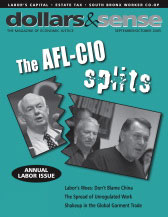The Other Big News at the Convention
This article is from the September/October 2005 issue of Dollars and Sense: The Magazine of Economic Justice available at http://www.dollarsandsense.org

This article is from the September/October 2005 issue of Dollars & Sense magazine.
Subscribe Now
at a discount.
The AFL-CIO took an historic step at this summer's convention, calling for the rapid withdrawal of U.S. troops from Iraq and an end to the country's occupation. Public attention has focused largely on the split in U.S. labor, and the decision by three of the federation's largest unions to leave. Yet this call will reverberate for years, with a profound impact on the future of U.S. workers and their unions.
Over the summer, in a campaign organized by U.S. Labor Against the War, resolutions calling for troop withdrawal poured in from unions, labor councils, and state labor federations across the country. But as the convention began, AFL-CIO national staff tried to substitute another resolution that called for ending the occupation "as soon as possible"--the same as the Bush administration's position. However, when members of the federation's executive council realized that they would face a floor fight, they agreed to accept the resolution calling for rapid withdrawal and an end to the occupation. On the second day of the convention, this language was adopted by an overwhelming majority of delegates.
The resolution marks a watershed moment in modern U.S. labor history. It is the product of grassroots action at the bottom of the labor movement, not a directive from the top. It also represents a deeper understanding of the intersection between labor issues and foreign policy that is making its way into workplaces and union halls around the country. In the many meetings and discussions that paved the way for the resolution, union members grasped the purpose of the occupation in a new way--as the imposition, at gunpoint, of Bush administration free market policies on Iraq.
Rapid withdrawal means more than just bringing U.S. soldiers home. Calling for it puts American workers on the side of Iraqis as they resist the transformation of their country for the benefit of a wealthy global elite. Brooks Sunkett, Communications Workers of America vice-president and Vietnam vet, spoke powerfully for this renewed unwillingness to wage wars based on lies and greed. His call for rapid withdrawal breathes new life into the Vietnam syndrome, so feared by U.S. administrations intent on military intervention to defend their free market policies around the world.
